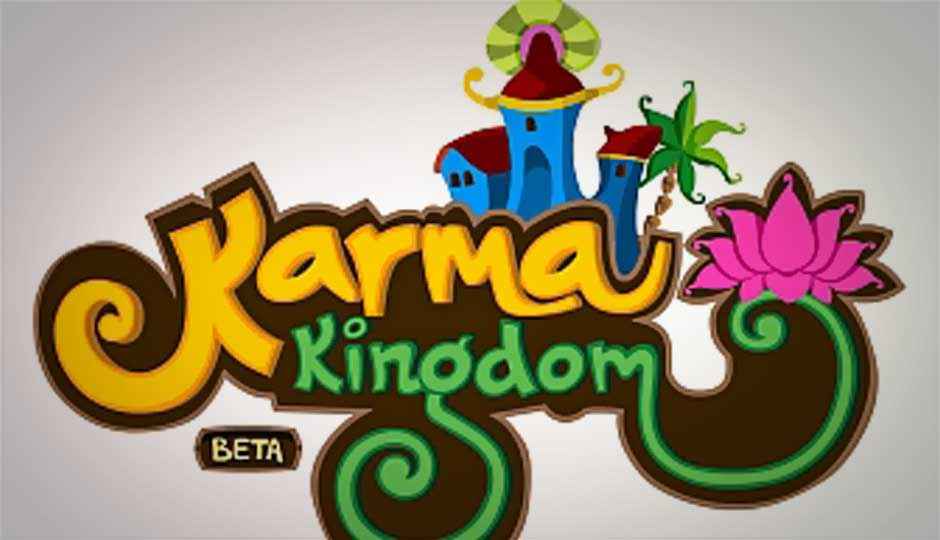Karma Kingdom: The game with a cause

Couple of months ago, we heard from Asvathaa which claimed to have developed a “game with a conscience.” Eager to learn more, we met with its founder and CEO, Ashok Desai, to see what the big deal was. Games like Karma Kingdom are definitely an example of the rapid strides taken in the world of gaming, especially from Indian developers.
Following is the excerpt from our interview. Mr. Ashok Desai’s responses begin with his initials — AD.
Q) Tell us a little bit about Asvathaa?
AD) Asvathaa was inspired by a desire to bring to market a new generation of social games and socially responsible content with the sense of giving back to those less fortunate. Asvathaa is a next-gen media business which leverages transmedia storytelling on a global scale. Asvathaa also leverages entertainment and engagement for social good and make time and effort invested in the virtual world socially productive in the real world.
Q) What is Karma Kingdom and why is it so unique?
AD) Karma Kingdom is a free to play and one of the hottest Indian mythology based social game which currently runs both on Facebook as well as Ibibo.com. Karma Kingdom allows players to earn in-game good karma that enables out of in-game good deeds. The gameplay in Karma Kingdom shifts the focus from “me” and “for myself” to “you”, “the society” and “the community” we live in.
Karma Kingdom combines the virtual and the real through a fun game medium. Karma Kingdom allows players to build a healthy community and providing for their health & education. Players can do so while playing a fun game and helping others, and through in-game contributions, players can actually directly support charities by helping to create sustainable projects and actions in real-world communities.
Q) Do you think Karma Kingdom will be a huge hit?
AD) Yes indeed. We view social media as an important gathering place for the global community. For the first time in the history of the world, Facebook has gathered 900 million people together – albeit virtually – and they all have the potential to network together and participate in charitable causes and healthy community building.
Q) What is Karma Kingdom’s intended audience?
AD) More than 575 million of Facebook users play social games – we view these players as our target audience and wanted to identify an innovative way to use the combination of an entertainment medium and a social platform to do good, providing them an opportunity to contribute. We also believe that the Indian diaspora will specially be interested in the first of its kind Indian mythology based original social game.
Q) What charities are you partnering with and how do they benefit from players playing Karma Kingdom?
AD) The game encourages players to establish “Personal Social Responsibility,” or PSR, in the real-world, with 100 per cent proceeds from charity-related in-game purchases going directly to some of the most important charities around the world, such as Sankara Eye Foundation. Sankara Eye Foundation (SEF) initiates and drives community eye care activities amongst the poorest patients in India by working with Sankara Eye Care Institutions, which run the Sankara Eye Hospital in Coimbatore and 7 other locations in India. We are currently in discussion with three other Charities dealing with Children’s education and community building.
Q ) Talk a little about Karma Kingdom’s game development process?
AD) We developed Karma Kingdom over a period of 14 months and had a team of about 12 people working on the same. We have a development center in New Delhi which we will scale with time. We took slightly longer than expected because we started with outsourcing some of the programming activities but realized we could not achieve the desired results hence we moved the effort in-house and then were able to complete the game. Our second game will take a much shorter period of time to develop. We are also working on developing games for the mobile platform and hope to release our first game sometime in mid-July.
Q) How many of Karma Kingdom’s gamers are based in India?
AD) We had a soft launch on Ibibo.com that started a week ago and we already have 2500 players which we hope to scale to many more once we are able to announce and promote the game.
Q) How do you plan to make money from Karma Kingdom?
AD) Asvathaa is a privately-held Transmedia company. Karma Kingdom is free to play and Bark Buddies is a children’s animated TV series. We generate our revenue through:
Through purchase of social goods or what is known as “virtual goods”. Each supported charity / partner has a virtual good associated with it.
From advertisers, through in-game advertisements, and cross portal ad revenue.
Through corporate sponsorships Through licensing and merchandizing tie-ups for Bark Buddies.
Conversely, 100% of our net revenues from supported charities / partners is returned to them to complete projects related to community, health and education building for the less fortunate. And in no case less than 10% of net revenues.
Like most forms of media, we do have advertisers and with each game, we commit to a social and sustainable cause. Karma Kingdom is committed to enabling the less fortunate become part of a healthy community with health and education provided for. We are taking the virtual act of creating a better world and transforming it into real world giving to groups like the Sankara Eye Foundation, Oxfam that provide for the less fortunate… and it’s fun.
Q) Tell us a little about how do you hope to grow over the next couple of years and what games are in the pipeline?
AD) We are looking at bringing out several original IP games as well as co-produce at-least a couple of animated TV series for children. We are also looking at raising an additional round of funding to help scale the business on all fronts.
Q) Are you bullish about the Indian gaming market?
AD) Absolutely. What we have seen so far is the tip of the iceberg and the best is yet to come. Our desire to introduce social games that drive a cause is unique in its category. We are sure it will strike a positive chord with our young players once they understand that they are able to feed a hungry child or provide education opportunity which will transform somebody’s life just by playing a free game and earning Karma points. I think we will rise to the occasion and put us right on top of the pecking order.
As per the recent FICCI-KPMG Indian Media and Entertainment Industry Report 2012, the Indian games business was valued at approximately $275 million up 30 per cent over 2011. The market is expected to grow by 38 per cent to $375 million in 2012 and to a staggering $925 million by 2016. Low cost game devices, dramatic increase in smartphone user base and ever-growing affluence amongst the middle-income groups in India will drive future growth for the gaming market.
All answers attributed to Mr. Ashok Desai, CEO, Asvathaa.
Jayesh Shinde
Executive Editor at Digit. Technology journalist since Jan 2008, with stints at Indiatimes.com and PCWorld.in. Enthusiastic dad, reluctant traveler, weekend gamer, LOTR nerd, pseudo bon vivant. View Full Profile





